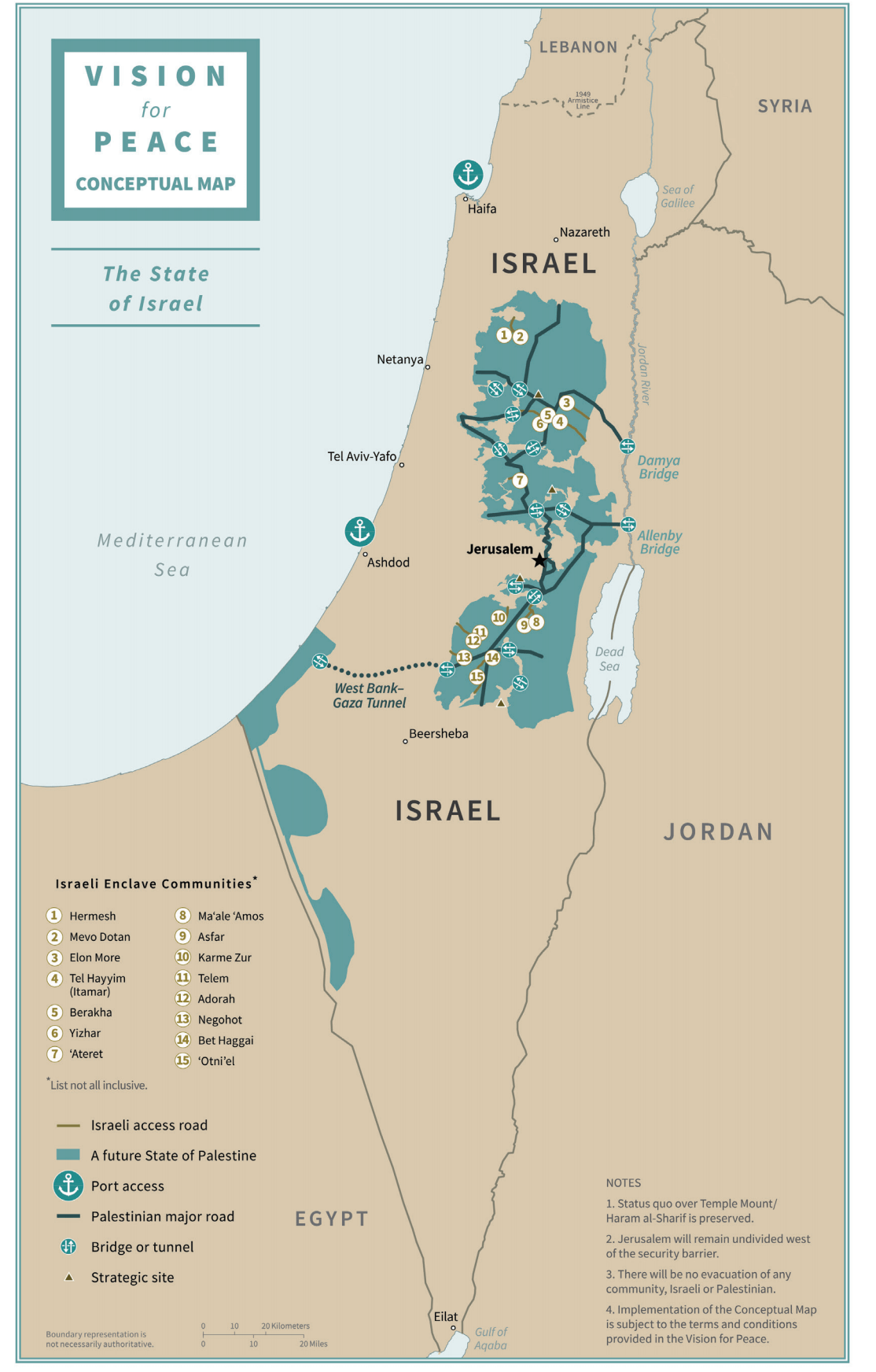In the wave of coverage and talking heads that is sure to follow Tuesday morning’s press conference on a Middle East peace plan, I can already hear the comments from the “Left” contrasting Trump’s embrace of Netanyahu with the criticism Obama allowed during his final days in office, most notably Kerry’s speech warning of the end of two-state viability.
Let’s be clear: announcing the death of the two-state solution in 2016 or today is akin to calling time of death long after a funeral.
The debate, the conversation, the driving force for peace and justice in Israel-Palestine cannot be about salvaging a territory of fragmented Bantustans, pieced together with a highway and tunnel.

The map released by the White House this morning, without consulting the Palestinians in any capacity, reflects the same governance plan that has been in effect since 1967: one geographic entity with every border controlled by the Israeli military, a continued denial of the refugee right of return, and an illegal occupation of Jerusalem and the Syrian Golan Heights.
A couple of years ago, a colleague and I were asked to give a talk to our department on President Trump’s potential effect on U.S. relations vis-a-vis Israel-Palestine. Though our presentation addressed the shifting landscape of the right wing in Israel, we – along with others at the time – largely focused on the continuity of U.S. policy and felt compelled to remind our peers of the severe lack of change from one president to the next. We did not do this to downplay the dangerous steps being taken toward entrenching a violent military occupation, but to remind the room that Trump did not get here on his own.
This reminder is as vital today as ever.
The content of the proposed “peace plan” is not a break from the past, nor is it a vision for a brighter future. It is another example of continuity in an Israeli policy of dispossession, displacement, and concentration of Palestinians and a reminder of the fraudulent notion that the United States has ever been an “honest broker” for a just resolution in the region.
Do not let the idea of continuity fool or lull you into believing that this proposal is inconsequential, though.
Netanyahu initially scheduled a cabinet vote for this Sunday to annex thirty percent of the occupied West Bank.
What we witnessed on Tuesday morning’s press conference was a stamp of approval for unilateral annexation and apartheid writ large.
As a geographer, I know and believe more than most in the power of maps. The Jerusalem Post correctly noted that this plan, unlike its predecessors came with one.
Maps portray a set of geographical imaginaries and intention. They can evoke as strong of a sense of affinity and belonging as they can of pain and disavowal. As children, we are taught to find ourselves on maps, to tie our identities to place and expect these places to affirm our presence in them. Maps have rarely included Palestinians – or other indigenous peoples the world over – let alone affirmed their history or continued existence.
There are almost seven million Palestinians living under Israeli control and another seven million refugees around the world. For the last seventy-two years, border upon border has been imposed upon them without consent or regard for their right to have a voice in their own future.
Ironically, despite today’s efforts to do this once again, to map and confine, Trump’s plan highlights just how unwilling Israel is to acknowledge the rights of Palestinians living within their historic borders.
As you read and listen to analysis of this plan, ask yourself who is speaking and who is missing from the conversation. What does it mean that an impeached president and a prime minister indicted for corruption are writing a vision for peace?
As you examine images of territory and roads, imagine instead neighborhood after neighborhood, family after family separated.
As you hear about offers and rejections, question instead the premise that the United States has a legal or moral authority to offer Palestinians a set of borders.
This article was originally published by the Fletcher Forum of World Affairs on January 29, 2020, and republished with permission.



https://www.theguardian.com/commentisfree/2020/jan/29/the-guardian-view-on-trumps-peace-plan-a-con-not-a-deal
“The Guardian view on Trump’s ‘peace plan’: a con, not a deal” Editorial, Jan. 29/20
“Donald Trump’s Arab-Israeli peace plan rests upon the absurdity of the Palestinians accepting a state in name alone. Since 1993’s Oslo accords, hope had been kindled that a ‘Palestine’ could be created from most of the West Bank and Gaza Strip, with its capital in East Jerusalem. The Trump administration’s document pays lip service to such an entity while shrinking its size and mutilating its scope to non-existence. It envisages the potential transfer of Palestinian towns out of Israel. It contains a blatant attempt to stop Palestinians seeking justice for war crimes – including those currently under way. Mr Trump boasts he is a dealmaker, offering $50bn in investment if Palestinians trade away their civil and national rights. But Palestinians see a conman with no intention of making good on empty promises.
“This proposal is a sop to right wing ideologues in the US and Israel. It ends the charade that Mr. Trump could play a mediating role in the Israeli-Palestinian conflict. Benjamin Netanyahu, the Israeli prime minister, has good reason to think his visit to Washington is his finest hour. He once warned Israel would be in mortal danger if a viable Palestine existed alongside it. The indications are Mr. Netanyahu’s cabinet will vote in days to begin annexing all settlements in the West Bank as well as the Jordan Valley. The old gibe against the Palestinians – that they never missed an opportunity to miss an opportunity for peace – is singularly inappropriate. Mr. Trump’s blatant support for Israel and his snub of the Palestinians in drafting his plan has let Mr. Netanyahu do whatever he wants.
“This looks like a transparent attempt by Mr Trump to help Mr Netanyahu, who faces a trial for bribery and fraud, in upcoming Israeli elections. With an impeachment trial in the Senate, Mr. Trump will also help himself with his plan – by rallying pro-Israeli evangelical support. The Trump plan does have the virtue of diminishing the distance between the situation on the ground and euphemisms deployed to describe it. Israel controls the land between the Jordan river and the Mediterranean Sea. If two viable states cannot be constructed in the Holy Land, the status quo will cement a one-state reality or perpetual occupation. Israel’s attempt to remain Jewish and democratic while controlling a space in which Arabs are as numerous as Jews is a quandary. The trilemma is how to retain a strong Jewish majority, all the land and a full democracy. Israel can live with such contradictions as long as Mr Trump allows international law to be flouted with impunity.
“Half a century of occupation has led to a system of institutionalised discrimination against Palestinians. Israel will seize on the fact Washington has ignored UN resolutions and endorsed its brutal, unlawful policies. Mr Trump wants to create new facts on the ground. Without Palestinian backing, some Arab states may be lukewarm about the plan. A two-state solution was the result of American peacemaking within a rules-based world order, which Mr Trump detests because it is inimical to the raw power that he prefers to govern global affairs. Outside the European Union, the UK’s foreign policy will become hostage to such an approach. London’s welcome of Mr Trump’s ‘serious proposal’ is as depressing as it is predictable. The US annexation proposals should be rejected and the illegality of Israeli settlements reiterated. A peace won’t last without an acceptance of past wrongs. Washington once championed international law to manage global relations. It now promotes the law of the jungle, where every country fends for itself. We are present at the creation of dangerous times in the world, not just in the Middle East.”
A large new study on morality in different cultures finds differences exist, but also some constants. In particular, the notion of sacrificing an innocent to save others is less acceptable when it is seen a means to an end rather than as an unavoidable side-effect. A variable that affects how different cultures assess different actions is called “relational mobility.”
Some Zionists, citing the Holocaust, justify dispossession and oppression of Palestinians by pointing to the treatment of Jews in Europe. I”ve seen it called “affirmative action.” This seems morally and logically a non sequitur to me, I’m not sure that all who cite this rationale believe it, but evidently some do.
I’m not sure that this study sheds much light on this willingness to sacrifice Palestinians, but here is the link:
https://www.vox.com/future-perfect/2020/1/24/21078196/morality-ethics-culture-universal-subjective